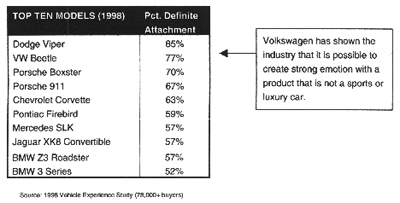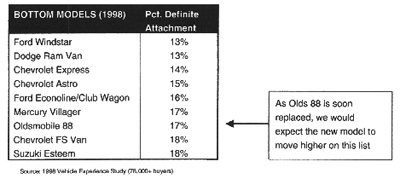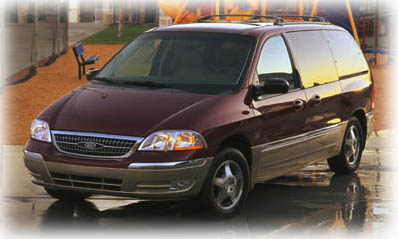by:
Daniel Gorrell, Strategic Vision Automotive
If you’re like the average buyer, at least two very distinct forces
help shape your decision when you choose a new car. While we like to think
we rely on our rational mind when spending so much money, the truth is
that emotion is a powerful factor that often wins the battle.
We have found that people have relationships with their cars and trucks
much like they do with their spouses and significant others. We have
measured these relationships over time and have discovered some
interesting differences in the passion that exists from one vehicle to
another.
In
Strategic Vision's latest syndicated study, Dodge Viper owners registered
the highest level of passion about their new vehicle. Given the financial,
and other, sacrifices Viper owners have to make for this raw,
heart-stopping performance machine, the finding makes sense. But what
about the rest of us?
We ask buyers to tell us whether they feel a definite emotional
attachment to their vehicles, some emotional attachment, or no emotional
attachment at all. (If you just bought a new car or truck, think about how
you would answer it.) We have discovered that this question taps one form
of passion or enthusiasm about the vehicle experience. Besides the obvious
"enthusiast" orientation, it often measures other sorts of involvement, as
is the case with the VW Beetle — voted the second-most emotionally
appealing vehicle among all 1998 models. Highlights from our proprietary
1998 polling include the following:
Are vehicle buyers emotionally committed? Most buyers (75%) admit to
having some sort of emotional attachment with their new vehicles. Almost
one in three (30%) say they have a definite attachment. On the other hand,
one in four (25%) say they have no attachment.
What about the quarter without attachment, are these people passionless
lumps? No, probably not. Quite often we find that these people either
won’t fess up to their relationship without further probing, or they
relate to their vehicles in other ways captured with different sorts of
questions.
Because of the cost and the importance of the benefits provided, every
single automotive buyer has some sort of emotional reaction to the
ownership experience. Some Japanese importers have told us they believe
that their buyers are buying a commodity, like a refrigerator, and have no
emotional response. They typically hear this in focus groups. This view is
not correct when you dig a little deeper.
Which models register the most passion? Dodge Viper owners (85%) report
having the greatest number of owners who say they have a definite
attachment to their vehicle. While other sports cars, convertibles and
luxury cars make this group, the second-highest model is a car — the much
less expensive VW Beetle (77%).

Which models register the least
passion? Minivan and full-size van owners register the lowest
incidence of emotional attachment (under 20%). Windstar and Dodge Ram
Wagon are the lowest scoring vehicles. Two cars in this group are Olds 88
and Suzuki Esteem.

Are men more passionate about their
vehicles? No! Emotional attachment does not appear to be a guy
thing. Among all buyers, women as a group (32%) are somewhat more
passionate about their vehicles than men (27%). We have discovered that
the nature of women’s emotional involvement is somewhat more grounded in
security and trust issues.
Do younger buyers have a greater emotional
attachment? Yes, they do. Half (50%) of the buyers under 20 say
they have a definite attachment to their vehicles. This makes sense —
unburdened by other cares, we often will focus more on automobiles at that
age. This incidence drops to less than one-third (30%) for those in the 30
to 39 age group and maintains roughly at that level for older buyers.

It's
hard to get worked up about the Windstar
This is all very interesting, you might say, but I own a Ford Windstar
(lowest rated on the passion scale) and I love my vehicle. It fits my
needs in the context of the family fleet, and I would probably buy another
one, even after the kids are gone. What gives? Is passion the only
dimension in a relationship? Well, of course not. In analyzing the
emotional response of vehicle buyers in-depth, we have discovered that
there are other ways that consumers register emotion that can signal a
strong and healthy relationship.
In minivans, the enthusiasm is not so much image-based (what will
others think of me if they see me driving a minivan), although it can be;
rather, it is related to the personal well-being associated with providing
safety, security and comfort to others. These others may be family,
elderly parents, church group or buddies at work who want to go to lunch
together as a group. Although it does not deliver the raw passion of a
Viper, a Windstar may strongly deliver another kind of emotional
punch.
|